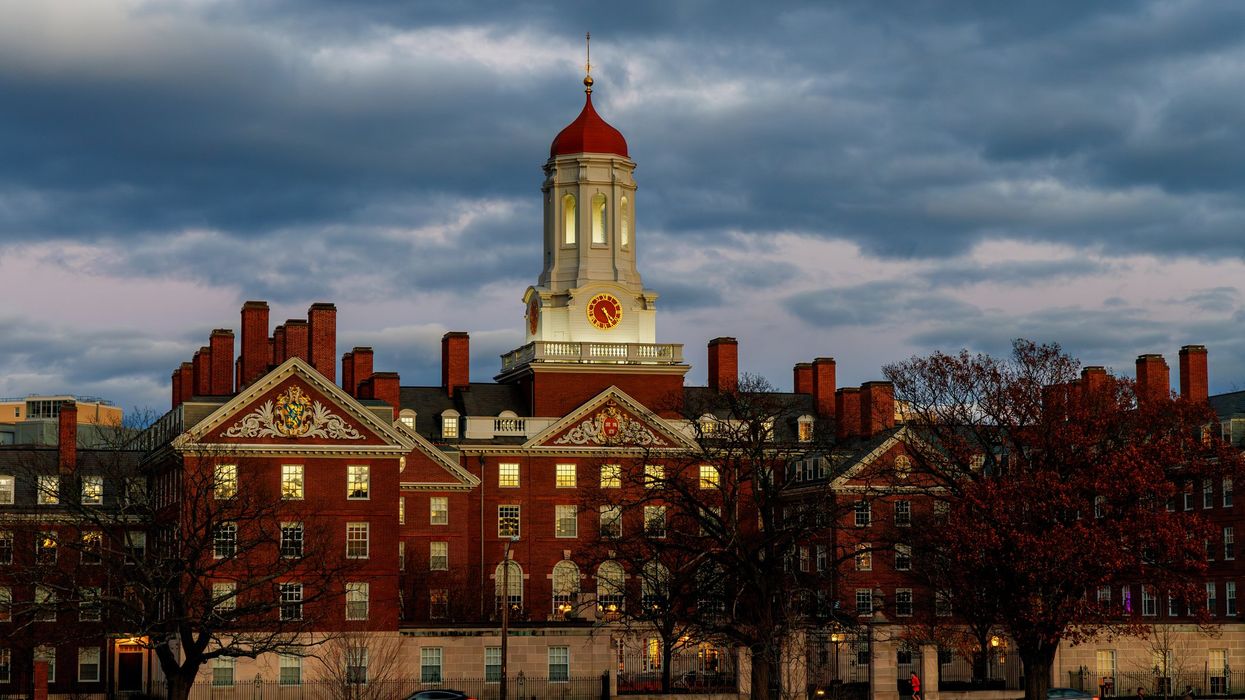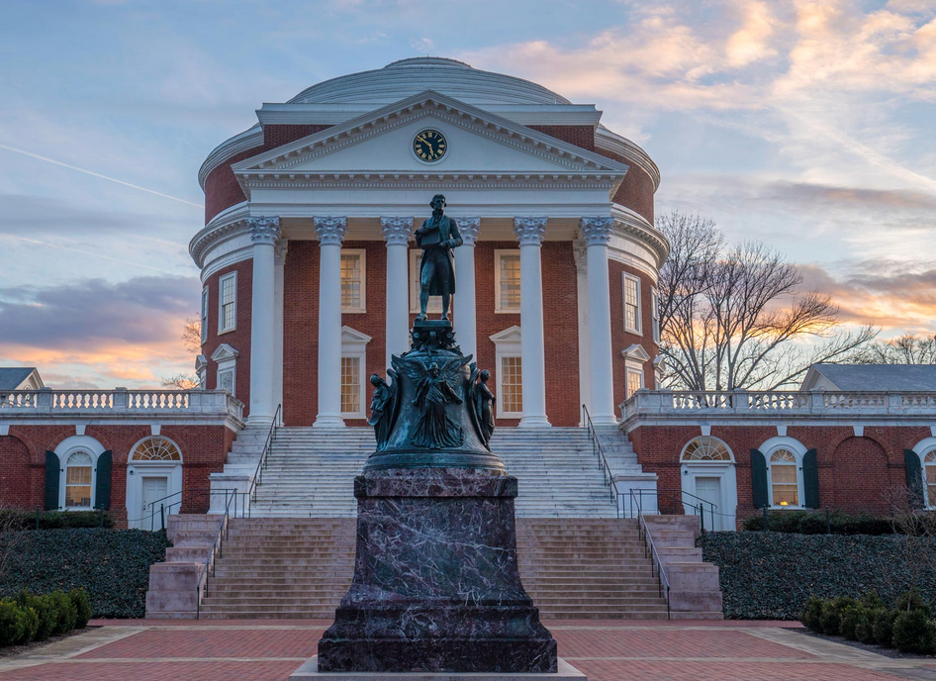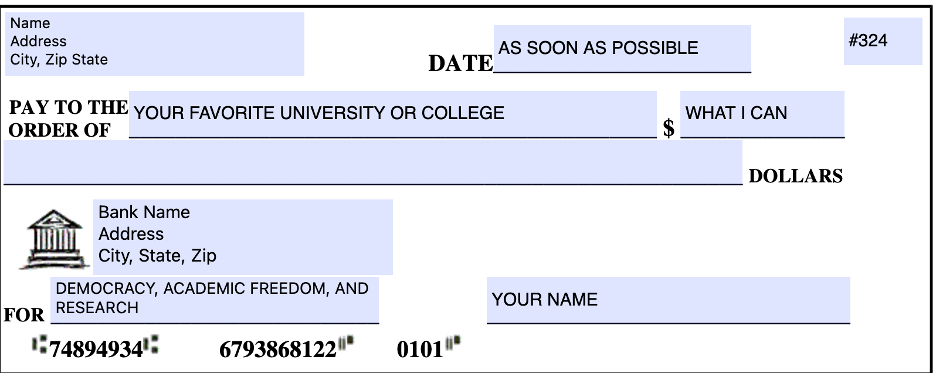“Our colleges [have] become dominated by Marxist Maniacs and lunatics.” Donald J. Trump, July 17, 2023
“We need to … aggressively attack the universities in this country; the professors are the enemy.” J.D. Vance, November 2, 2021
Under Donald Trump, the federal government has mounted the most aggressive and sustained assault on American universities in our history, targeting not only the values of intellectual freedom but also the institutions that drive innovation and economic growth. This campaign will shape the battle for democracy and could have grave consequences for the nation’s future.
Attacks on intellectuals are not new. Think of Galileo, whose endorsement of Copernican heliocentrism earned him an Inquisition and house arrest by the Catholic Church. Because intellectuals frequently raise difficult questions and challenge authority, those in power often make efforts to silence them. But rarely have institutions of intellectual life themselves come under such organized threat. Trump understands that undermining the economic vitality of universities can also choke off dissent and critical thought.
Americans hold sometimes conflicting views about higher education, especially our prestigious institutions. A college education is celebrated as a gateway to economic success and social mobility. But some schools such as Harvard, Columbia, and even the University of Virginia (UVA) are labeled elitist, often resented for their perceived liberalism, high costs, and admissions practices. This has made them vulnerable to political attack.
Universities are also economic powerhouses, often providing major engines for regional growth and employment. What would Charlottesville be without the University of Virginia, New Haven without Yale, or the Regional Triangle without Duke and the University of North Carolina? According to a recent report by United for Medical Research, every $1 invested in the National Institutes of Health (N.I.H.) research generates $2.56 in economic activity. Cutting funds means fewer start-ups, higher health care costs and the dismantling of one of our strongest innovation engines. And that is what Trump is trying to do.
American universities are also magnets for global talent and the reason the U.S. leads the world in science and innovation. It is no accident that students from around the world hope to study in the United States, because this is where breakthroughs occur and inquiry abounds. That standing is now imperiled.
Attacks on universities and intellectuals are typically associated with totalitarian regimes. Stalin executed and imprisoned many intellectuals as part of purges to consolidate power and eliminate perceived threats to the regime. Mao’s Cultural Revolution persecuted and jailed intellectuals deemed "counter revolutionary." Castro showed little tolerance for intellectuals expressing dissent opinions or challenging the government. Similar practices occur today in places like Hungary, Turkey, and Venezuela.
Trump has adopted a new strategy for stifling dissent, one that does not imprison thinkers, but instead economically starves the institutions in which they work.
THE PAST AS PROLOGUE
In the U.S., attacks on intellectuals have generally not led to imprisonment or death. Our embrace of the First Amendment and academic freedom have made such attempts difficult. Nonetheless, when attacks have occurred, they have been serious, and many lives have been destroyed in the process. Senator Joe McCarthy’s war on academia in the 40s and 50s, for example, focused primarily on individual professors with whom he disagreed, labeling them as Communists in hopes of getting them fired. A number of universities, including Harvard, took the bait, and discharged faculty (even those with tenure) not for dereliction of their professorial obligations, but because of their political philosophy. More than 100 left-leaning faculty lost their jobs during these years, often without due process. The exact numbers will never be known; many professors suffered in silence to enhance their prospects for future employment while the institutions that purged them often kept dismissals secret to avoid negative publicity.
After McCarthy’s political collapse, the attacks on professors subsided until resurrected in the 1960s during the Civil Rights Movement and Vietnam War. Still, the focus remained on individuals not institutions. When Ronald Reagan came to power in California assailing the free speech movement at places like UC-Berkeley, for example, he focused on individuals, either students or professors, who he considered dangerous because of their beliefs, famously declaring in 1969 that “if there has to be a bloodbath then let’s get it over with.” Nixon’s “enemies list” included respected academics like heart surgeon Michael DeBakey, Harvard law dean Derek Bok, Norm Chomsky, John Kenneth Galbraith, Daniel Ellsberg, Arthur Schlesinger, Jr., and the Presidents of Yale University and M.I.T.
Issues may change, but elected officials continue to target professors with whom they differ. In 2010, for example, then Virginia Attorney General Ken Cuccinelli took aim at climate scientist Michael Mann, then a professor at the University of Virginia. Cuccinelli, who subsequently became Donald Trump’s Deputy Secretary of Homeland Security and is now Gov. Youngkin’s nominee to the UVA Board of Visitors, employed a little used legal tactic called a civil investigative demand (CID) in hopes of forcing Mann and the university to release a broad range of documents related to his research that argued the severity of climate change. Cuccinelli’s actions struck many as harassment of an individual because of what he thinks. UVA came to Mann’s defense, and the CID was eventually dismissed by the courts.
And conservative commentators continue to relish in their criticism of so-called leftist professors. For a decade, Charlie Kirk and his Turning Point USA group have pursued college faculty members seen as proponents of dangerous ideas, even launching a website called “Professor Watchlist,” which lists faculty members it claims discriminate against conservative students or advance leftist thinking in the classroom.
THE WHOLE WORLD HAS CHANGED
With Trump in the White House, a more insidious approach has emerged to undermine dissent. Today, individuals are not the only focus; instead, the institutions themselves are also in the crosshairs. Entire departments like Black studies and initiatives on diversity, equity, and inclusion (DEI) are targeted for extinction. Research funding is being withheld or cancelled. Governmental investigations are being pursued.
These attacks are easier because of the decline in public confidence in higher education over the past decade. A Gallup poll in 2015 found that nearly 60% of Americans expressed trust in colleges and universities. By 2024, that figure had fallen to just one-third. Conservative media has relentlessly painted universities as bastions of "wokeism" and indoctrination. Phrases like “cancel culture,” “political correctness,” “critical race theory,” and “wokeism” are now code words to signal the disapproval of higher education. And the institutions and their leaders have not helped. When three Ivy League presidents cannot explain how calls to kill Jews are antithetical to free speech at a university, public confidence can easily waiver. And universities have done a poor job explaining why the overhead they collect from federal grants is justified.
Recent Trump attacks were foreshadowed by one of his competitors, Gov. Ron Desantis of Florida, who in 2023, totally transformed New College from an acclaimed small public liberal arts school into a conservative haven by appointing a new Board of Trustees, who then fired the President without cause, and began dismantling programs and courses that were anathema to conservatives. Within two years, over 30% of the faculty were gone, some resigning and others fired. Librarians were terminated. Books from now-discredited programs were “dumped.” In the process, Desantis had sent a message to other public institutions that the state would not tolerate education that posed a threat. Trump is now bringing these threats to a national stage.
MAKING HARVARD BLEED
In a recent meeting to discuss Harvard with his aides, President Trump reportedly asked, “What if we never pay them?” That soon became a key piece in a multifaceted pressure campaign designed to impose his will on the institution and academia. Threats to withhold funds work, especially as so many universities around the country rely increasingly on the federal government for research funds. Trump has already been successful in getting Columbia to capitulate to a series of demands in exchange for restoration of $400 million in funding. By executive order, Trump ordered funding freezes at other elite institutions like Brown, Northwestern, Princeton, and Cornell.
Harvard alone found the courage to refuse the demands of the administration. The institution has a lot to lose. In addition to freezing $3.2 billion in federal grants, Trump is threatening the institution’s financial health and global influence by trying (so far unsuccessfully) to halt the university’s enrollment of international students. The General Services Administration directed all federal agencies to explore ways to cut remaining contracts with the university, and Trump is targeting the school’s tax-exempt status, an action that, if embraced by Congress, could cost Harvard an estimated $850 million a year. The administration has opened eight investigations against the institution, adding Harvard to the list of 52 universities that are being examined by the Department of Education for DEI programs. According to the university, nearly every direct federal grant to Harvard's school of public health was terminated in May, including those researching cancer screenings and lung disease.
Harvard has responded with a flurry of lawsuits and has already been successful in obtaining a temporary order restraining Trump from preventing the enrollment of international students. It has been joined by a coalition of 22 state attorneys generalwho have challenged Trump’s funding cuts to universities and research institutions. But lawsuits take time, and substantial damage can be done even if the university prevails. Trump’s purpose seems clear—force Harvard to capitulate and use that victory to sow fear among more than 1,700 private universities and colleges that they could be the next target.
Several states, especially those with Republican legislatures, are also intruding on traditional university autonomy, from restricting DEI to undermining the system of shared governance of faculty and administration. Last year, HB 2735, a measure that would have reduced faculty members’ statutorily protected participation in shared governance while upgrading the power of public university presidents and the Arizona Board of Regents, passed the Arizona legislature before being vetoed by the state’s Democratic governor. The Chronicle of Higher Education lists other state bills passed into law prohibiting DEI at public universities and watering down independence in curriculum development and academic policy.
ACADEMIC FREEDOM
Modern universities embrace the Enlightenment tradition of a free search for knowledge in the belief that informed discussion fed by a wide range of ideas and is the best way to reach toward truth. As ideas are tested in public debate, people can choose the best of them. This was the basis of academic freedom that has enjoyed broad support for decades. As Steven Pinker recently argued, “Intellectual freedom is not a privilege of professors but the only way that fallible humans gain knowledge.”
Pinker, a Harvard psychologist, has considerable experience with the so-called “cancel culture”, where a professional remark can expose an academic to unwarranted personal attacks–from either right or left. He nonetheless asserts that universities should encourage unfettered discourse, because this is not only its purpose but the way society advances. Governmental action to compel universities to comply with a set of principles dictated from above merely stifles inquiry and undermines the fundamental purpose of education.
HAPPENINGS IN VIRGINIA
Except for Ken Cuccinelli’s attack on Michael Mann, the Virginia system of higher education has generally enjoyed bipartisan support. A recent poll conducted by the Virginia Business Higher Education Council (VBHEC) reported that 81% of Virginians believe Virginia’s colleges and universities prepare students with the skills needed to succeed in our changing economy. While tuition increases have been a concern for elected officials throughout the last two decades, rarely were arguments made that our universities needed a massive makeover–until recently with Gov. Glenn Youngkin’s attacks on DEI.
In Virginia, the governing boards of state colleges and universities are nominated by the governor and approved by the General Assembly. The legislature typically defers to gubernatorial recommendations, and, once approved, members of the governing boards generally put politics behind and cooperate in charting the future for their institutions. Youngkin’s selections to these boards, however, have proven to be less about proper management, and more out of efforts to transform these institutions. An example was the appointment of Bert Ellis to the Board of Visitors at the University of Virginia. Known for his abrasive nature and criticism that UVA had lost its way, Ellis was also a key player in The Jefferson Council, which recently published full page newspapers ads in the Richmond Times Dispatch calling for ouster of President Jim Ryan, primarily due to his past support of DEI initiatives. Ironically, Ellis’s performance on the Board, while clearly in line with Youngkin’s policy designs, was troubling enough that the governor ultimately discharged him from the role. He has now nominated Ken Cuccinelli as Ellis’s replacement, though it is highly likely that the General Assembly will NOT appoint him, especially if Democrats keep control of that body after this fall’s election.
Youngkin’s big push has been to eliminate DEI in state educational institutions, and he recently crowed on Fox News that “DEI is dead at UVA.” That has meant intruding upon traditional faculty prerogatives such as university curricula. Two courses recently developed in a multiyear effort at VCU and George Mason on “Racial Literacy” and “Just Societies” were cancelled shortly after Youngkin’s education secretary requested a view of the syllabi, and a Youngkin spokesman suggested the course requirements were a “thinly veiled attempt to incorporate the progressive left’s groupthink on Virginia’s students.”
Even medical centers cannot seem to escape the politicization of higher education. When K. Craig Kent, the then CEO of UVA Health was recently forced to resign following an investigation by the UVA Board of Visitors, Thomas Scully, a self-described lifelong Republican conservative who previously served as administrator of the Centers for Medicare and Medicaid Services in the second Bush administration and was serving on the UVA Health Services advisory board, called the action "silly partisan politics" played by the Board of Visitors, the vast majority of which have been appointed by Youngkin. Whether present President Jim Ryan, previously a prominent proponent of DEI initiatives can survive, remains an open question. The Trump administration and DEI critics such as the Jefferson Council continue to agitate, DOJ recently sending a letter to the Rector asking for more specific evidence of the unwinding of DEI.
Virginia’s schools are not as dependent on federal grants as many other institutions. Nonetheless, as of late May, Trump executive orders have frozen or eliminated at least 183 federal research grants totaling over $232 million across four UVa, Virginia Tech, VCU, and George Mason. Since UVA received $549 million in research awards in 2024, it is not yet clear whether other cuts are ahead.
WHAT TO DO
Supporting our universities at this time is critical. Make a contribution, however small, to your local college or university, to your alma mater, or even to Harvard, with a note that you support academic freedom and oppose Trump and state governments who would undermine it. Write your favorite college president and applaud him or her for joining several hundred college presidents in a Call for Constructive Engagement, or encourage them to sign the open letter. Thank a scientist for what they do. Participate in public protests coming up, including June 14. Write a letter to your paper or post your support on social media. Contact your state representative asking him or her to defend our system of higher education. Just like the Trump campaign is multifaceted, so too must ours.
Intellectuals often expose the lies of governments and provide challenging analyses of our society and culture. When they are silenced and their institutions crippled, critical thinking disappears—and with it, the foundation of a free Republic.
And Then They Came for the Intellectuals was originally published at the Substack "Fights of Our Lives" and is republished with permission.
David J. Toscano is a former Democratic leader in Virginia General Assembly, former Mayor of Charlottesville, Virginia. He is currently an author and attorney in Charlottesville, Virginia.






















